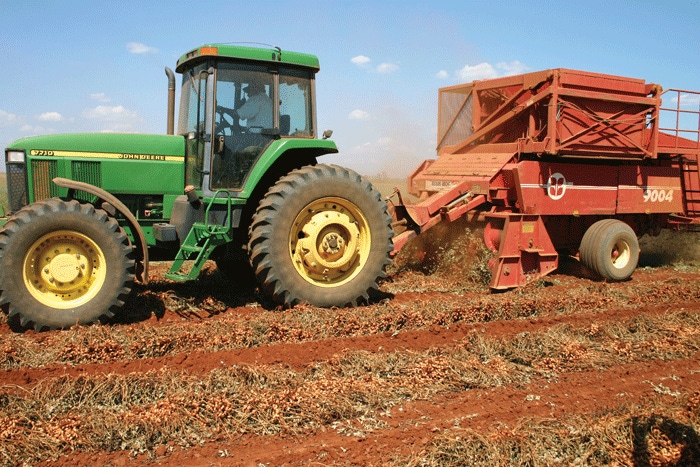
Some timely mid-summer rains have improved potential for the Southwest peanut crop, though overall production likely will be down because of significant acreage reduction.
“The peanut crop continues to look good,” says Manda Anderson, Texas AgriLife Extension integrated pest management specialist for Gaines County.
She says pod development takes three to four weeks after the peg enters the soil until it reaches full size. “Although the pod has reaches full size, kernel development has barely begun. Mature, harvestable pods require 60 to 80 days of development. Therefore, we have passed the final stage of the season where we can have enough time for a peg to develop into a mature pod.”
Growers now should direct efforts toward maturing the crop that’s already on the vines and not trying to set more blooms.
“It is time to slow down the pivots and give the field a deeper soaking irrigation,” she says.
If you are enjoying reading this article, please check out Southwest Farm Press Daily and receive the latest news right to your inbox.
Anderson says spider mites are showing up in some fields and recommends control measures. “Thorough coverage of the canopy is essential to control an infestation. Often it can take two applications to get satisfactory control of spider mites.”
She says labeled miticides kill only adults not mite eggs. “If conditions continue to be favorable for spider mite development and eggs hatch, then the spider mite population can rebound in a few days. A second miticide may need to be applied.”
Shelly Nutt, executive director, Texas Peanut Producers Board in Lubbock, says peanut potential across the state looks promising.
“From what I'm hearing, peanuts look very good statewide. The cool temperatures and showers in July were extremely beneficial for setting good pegs, and farmers are reporting strong plant vigor with minimal insect and disease pressure.”
“Crop conditions continue to surprise folk,” says Jason Woodward, Texas AgriLife Extension plant pathologist. “Recent rainfall has lessened the effect of drought, compared to conditions earlier in the season.”
But growers have a way to go before they harvest. “If the weather holds and we see a warm finish to August and a warm September and October, I expect better than average yields across the state,” Nutt says.
Fewer acres estimated
But those good yields will come from significantly fewer acres. Woodward, in the latest Peanut Progress Report newsletter, says final acreage may still be a question mark but will be much lower than last year’s 145,000 acres.
The latest USDA National Agricultural Statistics Service (NASS) report pegs Texas acreage at only 77,000, down from 80,000 estimated in June. Oklahoma and New Mexico acreage estimates are 17,000 and 6,000 respectively.
Woodward is not convinced Texas acreage is that low. “While there is no doubt acres are down from the 145,000 harvested in 2012, these estimates appear rather low,” he says. “In fact, the Farm Service Agency (FSA) certified acres report, which was released Aug. 15, indicated that approximately 111,000 acres of peanuts were planted this season. Certified acres for Oklahoma and New Mexico were consistent with NASS estimates.”
Texas peanut acreage isconcentrated in the High Plains. Cochran, Yoakum and Terry County farmers plant an average of 14,700 acres each and Gaines County producers typically plant more than 25,500 acres. In South Texas, Atascosa and Frio counties account for 15,757 acres; in the Northern Rolling Plains, Collingsworth, Donley and Wilbarger counties plant 12,085 acres.
Woodward says, even with recent, timely rain, growers should not be in a rush to turn off irrigation systems. The same practice that works in cotton is not recommended for peanuts. He says cotton farmers may begin shutting off irrigation to mature the crop.
“That tactic is not advised in peanuts at this time. Research results from both Texas and Georgia indicate that stressing runner peanuts now may be detrimental to yields, as water is still needed to fill developing pods. This is also true of Virginia-types. When considering Valencia and Spanish peanut types, it may be necessary to determine if pods are fully developed, as these market types can mature considerably earlier than runner and Virginia (peanut) types.”
He says if the crop is maturing at a steady rate, and has adequate moisture in the soil profile, growers may reduce irrigation output. “However, these decisions will be on a field-by-field basis and may require close observations to minimize stressful conditions.
For more information about current conditions of the Texas peanut crop check here.
Also of interest:
Timeliness, cost management critical for Peanut Profitability winners
International team seeking to unravel peanut genome (Part 2)
International team seeking to unravel peanut genome (Part 1)
About the Author(s)
You May Also Like






